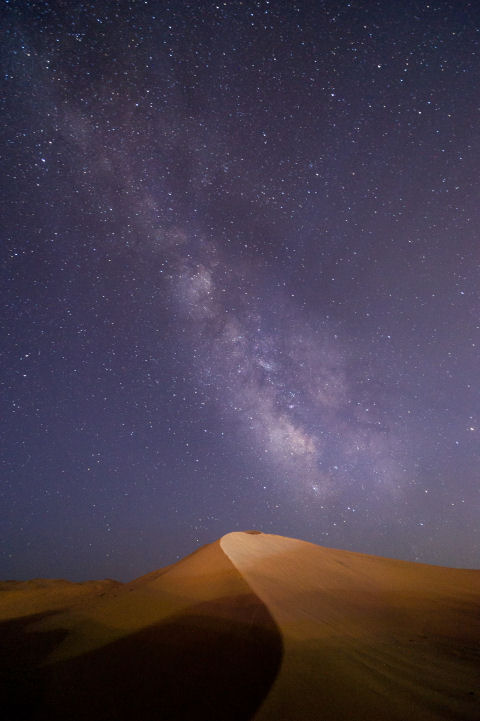On a dark and moonless Arizona night in 1983 I was driving back to Tucson on Highway 79 after a weekend of skydiving in Coolidge. It was a longish drive and as happens on longish drives I found I was in need for relief. I pulled over at the historic site commemorating the life and death of Tom Mix, a cowboy star of the silent movie era.
I opened the door of my Toyota pick-up and was greeted with dead silence and pitch blackness. The desert was dark and quiet. The lights of Tucson were sealed off by the Catalina Mountains, a sky island with peaks jutting 10,000 feet above the desert, spanning fifteen miles. There were no isolated ranches, no stores, no lights and no cars.
I was utterly alone in the desert night.
As I stepped into the desert darkness, I forgot all about my need for relief. The sky was so bright it startled me. I have never seen so much light in a night sky. The stars were shining so brightly from every direction that I found myself in the middle of a circular shadow.
I grew up in Oregon where stars are a rare treat because of the constantly clouds. Even on cloudless nights the sky is so full of moisture that the stars are dimmed, and constellations are hard to make out.
But not on this night in the Arizona desert. I realized that I was seeing the same night sky as ancient Greeks and earliest humans.
I stared at the vastness of space and realized I could see a bright belt of stars concentrated together traversing the sky. What could that be, I thought. It took me a minute to realize I had asked the question aloud, and answered aloud as well…
I was looking at the Milky Way Galaxy.
It was one of the most amazing sights I’ve ever seen…and one I probably won’t ever see again anywhere near Tucson.
So many people have moved here that entirely new cities are now erasing the beautiful desert that used to surround Tucson.
The stars don’t shine any more.
Over population is not only creating light pollution blotting out the starts, or global warming bringing widespread habitat destruction, wildfires and extinctions. Overpopulation is killing the Earth in every way imaginable
I recently found out that roads and buildings permanently sterilize the dirt beneath them. Nothing will ever grow there until the soil is naturally reconstituted in much the same way it was created in the first place.
That’s not just pollution, that’s destruction.
It’s as if we are committing genocide not only against the life forms of Earth, but on the mechanisms that support them.
Almost three hundred years ago Thomas Malthus predicted that the Earth would not be able to sustain the population explosion that was apparent even in his day. But advances in agricultural science have proven him wrong.
So far.
The wisdom of growing huge fields of identical plants is beginning to show cracks. Diversity is a good thing, for plants as well as people, and monoculture agriculture seems to be approaching the end of its lifecycle.
But humans have a knack for figuring out ways to survive. Even if it comes at the expense of the world in which we live or the quality of life of our descendants.
Tens of thousands of people abandoning California, Portland and Seattle because of high taxes, outrageous housing costs and failed social experiments have come here to southern Arizona. They sold their homes for far more than the asking price for a home here in Arizona.
The result is an increase in real estate values that have priced many native Arizonians out of their traditional locations. The immigrants to Arizona are bringing with them the same problems they are escaping.
The same thing happened in Oregon when I was growing up in the 1970’s. People began migrating from California to escape the high taxes, social problems and environmental degradation that comes with overpopulation. There were prescient bumper stickers at the time saying “Don’t Californicate Oregon”.
It didn’t help.
When I was in high school I could walk to Keizer Rapids with my duck decoys and shotgun and if I were lucky bag a duck or goose for dinner before I had to go to school. Now it’s a park frequently by homeless drug users.
Oregon legalized addictive drugs creating a huge social tragedy, reduced high school graduation requirements because their schools no longer teach and they are facing a homeless crisis on par with California and New York.
That’s a microcosm of the attitudes that are propelling us into environmental disaster.
How come we don’t think about the carbon footprint a new baby will make over the course of a lifetime?
Elon Musk talks about the necessity of populating the Earth, and the inevitability of having to move off world to Mars.
Musk doesn’t seem to understand that he is creating the problems from which we need to escape.
I’m all for space travel, but moving to other planets because we have utterly wrecked ours is unconscionable. What kind of spacefaring species we are destined to turn into?
Will aliens look at us with disgust because we reproduce so prodigiously and irresponsibly, quickly filling our living spaces with our own wastes and poisons, then moving on to pristine worlds to obliterate them?
No wonder ET isn’t talking to us.
Like What You’re Reading?
Read more at VicNapier.com and my Medium.com page.
Links may lead to sites where the author has an affiliate relationship
